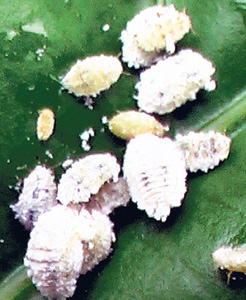The parasite to fight and control the mealybug or piti makuna that is wreaking havoc to local plants, fruits, and flowers is to be brought down from Puerto Rico after Avurudu, while the Agriculture Department steps up its efforts, supported by the weather gods, to curb this pest.While discussions were on between the Horticultural Crop Research and Development Institute and the American authorities to airlift the parasite, sources in the Agriculture Department were hopeful that the rainy weather will rein-in the spread of the epidemic.
Earlier there were plans to courier the parasite from Puerto Rico, but it would die within the seven days it takes to do so, institute director Dr. J. Soysa, said. “So we are hoping to airfreight it,” he said.
 |
| The dangerous mealybugs |
As agro-chemical companies such as Hayleys and CIC set up help desks and joined forces with the Agriculture Department, The Sunday Times understands that many groups have been mobilized to fan out across the affected areas to battle the piti makuna.When asked why there seems to have been lethargy on the part of agriculture officers in combating this menace which was first reported in June last year, a source said the department got activated soon after the first reports came in that the destructive bug had come from South India.
“As there are mealybugs in the country, we needed confirmation that this was a new and invasive species. We were able to confirm this by August and set about controlling it. Then when the rains came last year, there was a natural reduction in the pest,” the source explained, adding that it emerged once again in January and February this year when the weather turned hot.
The department has been conducting massive awareness campaigns among the people and advising them on simple control methods and also working with the Provincial Councils in the affected areas. Agriculture Research and Development Officers, Grama Niladharis and Samurdhi Niyamakas have all been mobilized, the source explained. “We have also spread the message through the media.” Asked whether there was a help-desk, the source said that anyone who needed information about this menace could contact the department’s toll-free helpline 1920.
Other experts suggested to The Sunday Times that the department should get the assistance of local government bodies and professional pest control organizations to spray large trees affected by this pest.
|
